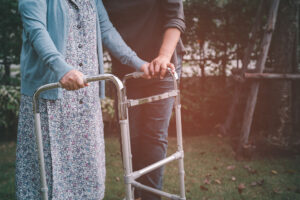
Companion care at home help aging seniors with daily care and safety.
Balance is essential to mobility and freedom, yet maintaining balance becomes increasingly difficult as people age. Balance disorders in seniors are a complex problem caused by physiological changes, medical conditions, and environmental variables. Addressing these issues requires knowledge of the root causes to ensure safety and improve quality of life. With companion care at home on their side, seniors gain the education and support they need.
Age-Related Changes in Balance
Natural physiological changes that occur with age can disrupt equilibrium. For instance, sarcopenia is the reduction in muscle mass and strength with age. These reductions impact the body’s ability to stabilize itself.
Additionally, the sensory systems responsible for balance—vision, the vestibular system in the inner ear, and proprioception (the perception of body position)—may deteriorate with age. When this happens, reduced eyesight or depth perception might make navigating uneven surfaces more challenging, while inner ear abnormalities can diminish spatial awareness and balance.
Chronic Medical Conditions
Chronic diseases contribute significantly to balance issues in seniors. With this in mind, companion care at home providers can help seniors understand the relationship and encourage them to talk with their medical team to ensure they have the support they need. For example:
- Neurological Disorders: Neurological disorders such as Parkinson’s disease, multiple sclerosis, and stroke can impair coordination, muscular control, and balance. Seniors with these disorders are especially prone to falls.
- Diabetes: Peripheral neuropathy, a common complication of diabetes, can cause loss of sensation in the feet, making it difficult to maintain posture and balance.
- Cardiovascular Issues: Reduced blood flow to the brain, such as in hypotension or arrhythmias, can produce dizziness or fainting, raising the risk of losing balance.
- Arthritis: Pain and stiffness in joints, particularly in the hips, knees, and ankles, can limit movement and cause instability.
Medication and Side Effects
Many seniors take a number of medications to treat chronic diseases, which is known as polypharmacy. Some drugs, including sedatives, antihypertensives, and antidepressants, can cause dizziness, sleepiness, or decreased coordination. These adverse effects can make it more difficult to maintain balance, particularly when moving from sitting to standing.
Psychological Factors
Fear of falling is a prevalent concern among seniors, and it can lead to balance issues. This dread may lead to decreased physical activity, which causes muscle weakening and increases the chance of falling. Anxiety and depression, which are common in seniors, can also affect concentration and coordination.
Environmental and Lifestyle Factors
External variables such as poorly lighted areas, busy sidewalks, and uneven surfaces increase balance issues. Companion care at home providers can encourage seniors to wear proper footwear whenever they’re out and about to reduce their risk of falling.
Preventing and Addressing Balance Issues
To address balance concerns, seniors should take proactive measures, including the following:
- Regular Exercise: Exercises, such as tai chi, yoga, or balancing training, increase strength and coordination.
- Medical Management: Addressing chronic diseases and evaluating medications with a healthcare provider can help lower risk factors.
- Home Modifications: Simple modifications, such as installing grab bars, enhancing lighting, and eliminating tripping hazards, can make environments safer.
- Assistive Devices: Canes, walkers, and even balance-oriented footwear can improve stability.
Understanding and resolving the underlying causes of balance issues is critical in assisting seniors to preserve mobility, reduce falls, and live independently. With support from companion care at home and the correct interventions, aging does not have to imply losing balance or confidence.
If you or an aging loved one is considering Companion Care at Home in Los Angeles, CA, please contact the caring staff at Nu Care Inc. today at. 800-505-6890
Sources:

